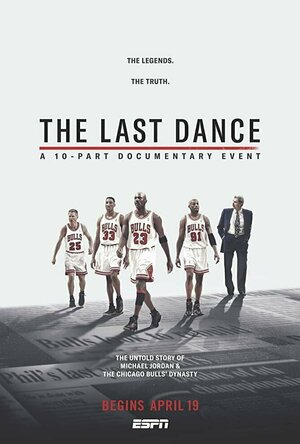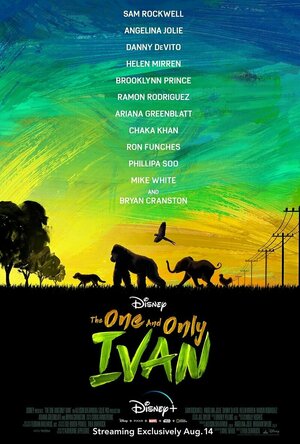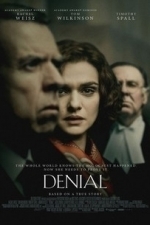Kirk Bage (1775 KP) rated The Last Dance in TV
Aug 6, 2020 (Updated Aug 6, 2020)
Basketball for me has never really been a thing. To be honest, I barely understand the rules beyond the basics. It just wasn’t something that was on British TV that often as I grew up, the Olympics being an exception. The skill level (and height above Sea level) needed to be good enough for NBA glory does not escape me though, and neither has the exceptional career of Michael Jordon, who is a clear contender for greatest sportsman of all time, in any sport.
What I do enjoy though is the drama of over-coming hurdles and records against all the odds. The underdog story really appeals to me, as does the story of an older athlete doing it one last time, when no one thinks it’s possible. The Last Dance is exactly that. But not told by actors in a Hollywood way, like the wonderfully under-rated Miracle starring Kurt Russell. This is a documentary, in ten parts, with the real guys, and some of the most comprehensive archive material you’d ever want!
In theory, the tale is about the whole team, and their final fling at winning a title before knowing the aging gang would be disbanded, with the key figures forced into retirement. But, it is about Jordan, of course it is. And as a document of a rise to fame, and how the man responded to that fame and increased pressure, it is simply the best sports documentary yet to be made.
Told in parallel timelines of the final year juxtaposed with the backstory of the previous 20 years, it shows in exquisite detail how a franchise was built, maintained and taken to the heights of being the greatest ever to play the game. There are tantrums, fall outs, walk outs, no shows, injuries, and some mind-bending successes riding on single moments of genius.
The main voices of Jordan himself, as he sits in retirement with a cigar and a single malt, Scottie Pippin, and bad boy Dennis Rodman, are in parts fascinating, eloquent and revealing. Even after many years have passed, the emotion of big moments and issues is still fresh. We see the joy, the pride and the exhilaration, but also the regret, the grudges and the pain. It shows every angle of what being an athlete at the very top means, and exposes what kind of mentality you have to have to be that person. To be a champion.
As with me, it really helps with the cliffhanger drama of it if you don’t remember, or never knew at all, the result of that “last dance” season in ’98. It also helps if watching sport raises the pulse, but I wouldn’t say it is essential, as it all plays like an ten part series full of drama, betrayals and gasp out loud moments. Ten hour long episodes is a lot. But this incredible production never out stays its welcome. Some acheivement, and testament to what a charismatic figure Jordan was and is on the context of sport history.
Of course, not every hero is a hero every minute of his life. And that is my final reason to recommend it. See for yourself what kind of personality virtual gods like these invent for themselves. Utterly compelling TV.
Lee (2222 KP) rated The One and Only Ivan (2020) in Movies
Sep 2, 2020
There were no talking animals in the real version of events this is based on, but there was a silverback gorilla named Ivan,
Stolen as an infant from the rainforests of Congo and made to live in a tiny cage, while regularly putting on a show for visitors to a shopping centre for 27 years in total. This being a Disney movie though, the cruelty of that is glossed over somewhat, with funny animal friends with wacky voices aiming to brighten things up. Although, the message that his captivity was wrong is certainly there for all to see, and hopefully to be appreciated.
Bryan Cranston is Mack, the showman responsible for raising Ivan and making him a star, bristling when enthusiasm and “the show must go on” spirit, despite dwindling audiences and occasional animal illness. From flashbacks, it’s clear that Mack loves Ivan, his passion for raising him having cost him his marriage. But now that Ivan is the star of the show at the mini circus in the mall, complacency has set in, and Mack cannot see that all Ivan now truly wants is his freedom.
In an attempt to try and bring in the crowds, Mack brings in a baby elephant, which takes over top billing status from Ivan, much to his disappointment. Elderly elephant Stella (Angelina Jolie) takes the new baby under her wing, and during some late night storytelling sessions between the animals, we learn that Ivan had a sister back in the jungle, and was actually a budding artist, using mud to paint on rocks. When Julia, young daughter of one of the helping hands at the circus, gives Ivan some of her old crayons and finger paints, Ivan begins drawing again, and is soon moved back up to top billing in the show.
When I first saw the trailer for The One and Only Ivan, I was totally on board. That is, until the animals started talking. I thought the CGI remake of The Lion King last year was just terrible, and the Lady and the Tramp remake which landed on Disney+ earlier this year was even worse. Realistic looking animals simply cannot convey emotions like their traditionally animated counterparts, while retaining their realistic looks. But The One and Only Ivan thankfully feels so different, much better than those movies do. And a lot of that is down to the voice cast.
Sam Rockwell is Ivan. Perfectly cast, he brings a real much needed gravitas to the sombre silverback. Along with the stray dog (Danny DeVito) that visits Ivan’s cage and sleeps on his belly at night, they form a delightful double act, discussing freedom, and the fortunes of the circus. With a lot of time being spent with the animals in their cages, the movie does drag a little at times, but then maybe that’s the whole idea – portraying the solitude and boredom experienced when you do not have your freedom.
As if it wasn’t already clear enough, The One and Only Ivan nicely drives home the important message that animals really shouldn’t be kept in pokey cages for long periods of time, and certainly not for decades either. The end of the movie reminds us that Ivan’s story is actually based on truth, as we’re shown photos of the real Ivan, who stayed with a family before becoming a circus act. Seeing the photos of his eventual release to the vastly improved setting of Atlanta zoo, where he lived out the rest of his days, certainly proves to be very emotional, and a fitting end to a surprisingly enjoyable family movie.

Photography Week: the weekly digital camera mag
Photo & Video and Magazines & Newspapers
App
***FREE 30-DAY SUBSCRIPTION TRIAL – GET OUR LATEST ISSUE FREE TODAY!*** Photography Week is a new...

Pocket Kamasutra - Sex Positions and Love Guide
Catalogs and Book
App
Do you like sex? Do you want to be better at it? Then you’ve come to the right place! Pocket...

Pocket Kamasutra - Sex Positions, Love Guide Lite
Catalogs and Book
App
Do you like sex? Do you want to be better at it? Then you’ve come to the right place! Pocket...

ViaMichelin GPS, Route Planner
Navigation and Lifestyle
App
Discover all the ViaMichelin experience and know-how at the heart of its free application (no...

Handy Photo
Photo & Video and Entertainment
App
***** “What does it do? Everything… quickly and easily. It’s really awesome!“ – Life In...

Blinkist - Always Learning
Education and Book
App
Where do the world’s smartest people get their ideas? From great books! Blinkist distills the key...
Bob Mann (459 KP) rated Denial (2016) in Movies
Sep 29, 2021
Help is required and Lipstadt is assigned a hot-shot solicitor (if that’s not an oxymoron) in the form of Anthony Julius (Andrew Scott, “Sherlock”) and top barrister Richard Rampton (Tom Wilkinson, “Selma“). The stage is set for an epic legal battle that will establish not just legal precedent but also historical precedent affecting the entire Jewish people.
This film’s trailer really appealed to me, and I was looking forward to this film. And that view clearly also got through to people of my age bracket (and older) since the cinema was pretty full. But ultimately I was disappointed by the film.
But first the good points.
The cinematography by Haris Zambarloukos (“Thor”, “Mamma Mia”) is memorable, particularly for the Auschwitz tour which is done in an impressively bleak way on an astoundingly bleak winter’s day.
Andrew Scott, so woefully miscast as “C” in “Spectre“, here is a nice shoo-in for the cocksure but aloof expert. And Tom Wilkinson, who can seldom put a movie foot wrong, is also perfectly cast as the claret-swigging defence-lead: passionless and analytical even when facing the horrors of a trip to Auschwitz.
Timothy Spall’s Irving is well portrayed as the intelligent and articulate – albeit deluded – eccentric he no doubt is.
There are also some nice cameo performances, including John Sessions (“Florence Foster Jenkins“) as an Oxbridge history boffin and Mark Gatiss (“Sherlock”) as an Auschwitz expert.
However, these positives don’t outweigh the big negative that the broader ensemble cast never really gels together well. The first time this is evident is in an office meeting of the defence team where the interactions have a sheen of falseness about them that is barely hidden behind some weak script and forced nervous laughter. Tea can’t help.
In particular, attractive Kiwi actress Caren Pistorius (“The Light Between Oceans“) seems to have been given a poor hand to play with as the junior member of the team. A late night interaction with her boyfriend, who whinges at her for having to work late, seems to be taken from a more sexist age: “the 70’s called and they want their script back”.
None of this is helped by Rachel Weisz, who I’m normally a fan of, but here she is hindered by some rather dodgy lines by David Hare (“The Reader”) and an unconvincing (well, to me at least) New York accent. For me I’m afraid she just doesn’t seem to adequately convey her passion for the cause.
While the execution of the court scenes are well done, the film is hampered by its opening five words: “Based on a True Story”. This is something of a disease at the moment in the movies, and whilst in many films (the recent “Lion” for example) the story is in the journey rather than the result, with “Denial” the story is designed to build to a tense result that unfortunately lacks any sort of tension – since the result is pre-ordained.
This is all a great shame, since director Mick Jackson (“LA Story”, in his first feature for nearly 15 years) has the potential here for a great movie. Perhaps a more fictionalised version (“vaguely based on a true story”) might have provided more of a foundation for a better film?



